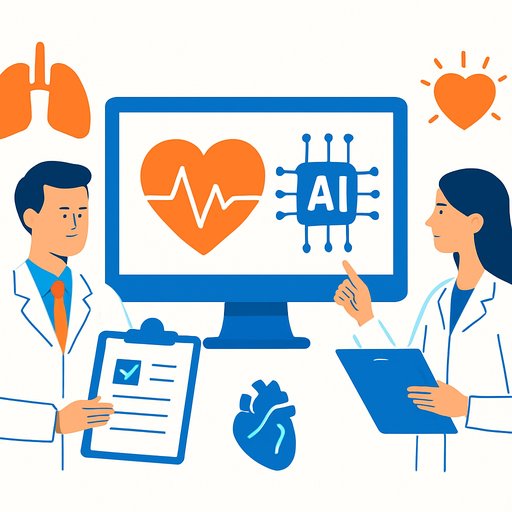Anumana advances AI-driven cardiovascular science with late-breaking heart failure study and new AHA 2025 data
Anumana released new clinical evidence at the American Heart Association Scientific Sessions 2025, including a late-breaking featured science presentation published in the Journal of the American College of Cardiology. The data show that ECG-AI layered onto established risk scores improves near-term prediction of incident heart failure. Three additional abstracts demonstrate broader utility across pulmonary hypertension and population research questions.
What the featured study found
The pooled cohort analysis combined more than 14,000 participants from the Framingham Heart Study, Multi-Ethnic Study of Atherosclerosis, and the Cardiovascular Health Study. Integrating Anumana's ECG-AI with the PREVENT-HF clinical risk equation significantly improved short-term risk stratification, reclassifying up to 12.5% of individuals into higher-risk categories missed by clinical factors alone. Participants with a positive ECG-AI were over 20 times more likely to develop heart failure within three years than those with a negative result.
"AI analysis of standard 12-lead electrocardiograms (ECG-AI) allows detection of subtle electrical changes that signal early cardiac dysfunction," said Akshay S. Desai, MD, MPH, Director of the Heart Failure Disease Management Program, Brigham and Women's Hospital, and lead study investigator. "The implication is that ECG-AI may help clinicians to identify at-risk patients years before symptoms of HF appear, creating opportunities to start preventive therapy sooner and improve long-term outcomes."
The study was conducted within the NHLBI HeartShare/AMP Heart Failure Program and leveraged the BioData Catalyst platform for secure access to deeply phenotyped longitudinal cohorts and reproducible analytics. The featured science was published in the Journal of the American College of Cardiology. For context, see the journal site and the platform overview below.
Algorithm performance and clinical signal
Anumana's ECG-AI LEF algorithm analyzes standard 12-lead ECGs to flag low ejection fraction, a key indicator tied to heart failure risk. Reported performance: AUC 0.944, sensitivity 90.2%, specificity 85.1%. For researchers, this creates a practical path to risk-enriched cohorts, earlier intervention studies, and targeted screening workflows using data that already exist in the record.
"This publication marks meaningful progress toward a future where AI helps prevent disease rather than just detecting it," said Simos Kedikoglou, MD, President and COO of Anumana. "It demonstrates how our ECG-AI LEF algorithm can uncover early signs of heart failure, supporting clinicians in identifying at-risk patients sooner and enabling more proactive care."
Additional AHA 2025 abstracts
- Multicenter ECG-AI for pulmonary hypertension: Across five U.S. health systems, ECG-AI detected pulmonary hypertension with 84% sensitivity and 72% specificity, pointing to earlier identification opportunities.
- AI ECG for early PAH and CTEPH: In a retrospective real-world analysis, over 74% of patients had at least one ECG between first symptom and diagnosis that was flagged positive by ECG-AI PH, suggesting potential to shorten diagnostic delays.
- Parity and Takotsubo cardiomyopathy: Researchers built a method to infer lifetime pregnancies from EHR data to examine links between parity and Takotsubo risk.
Why this matters for scientists and clinical researchers
- Risk enrichment: Combine ECG-AI with PREVENT-HF to identify high-risk, pre-symptomatic populations for preventive trials and implementation studies.
- Pragmatic screening: ECGs are ubiquitous. Embedding AI scoring in the ECG workflow can surface candidates for natriuretic peptide testing, imaging, or early therapy.
- Generalizability and bias: The pooled, multi-cohort design is a good start; next steps include prospective validation, subgroup analyses by age, sex, ancestry, and comorbidity burden.
- Health system integration: EHR-triggered alerts, threshold tuning for different care settings, and outcome-linked pathways will define real-world impact.
About Anumana
Anumana is an AI-driven health technology company focused on transforming cardiovascular care through software-as-a-medical-device solutions. Co-founded by nference and Mayo Clinic, the portfolio spans ECG-based algorithms, imaging applications, and intraoperative guidance tools for diagnostic and perioperative use. The FDA-cleared ECG-AI LEF algorithm is available in the U.S. and eligible for reimbursement as of January 2025.
Learn more at www.anumana.ai. Follow Anumana on LinkedIn and X for updates.
Your membership also unlocks:






